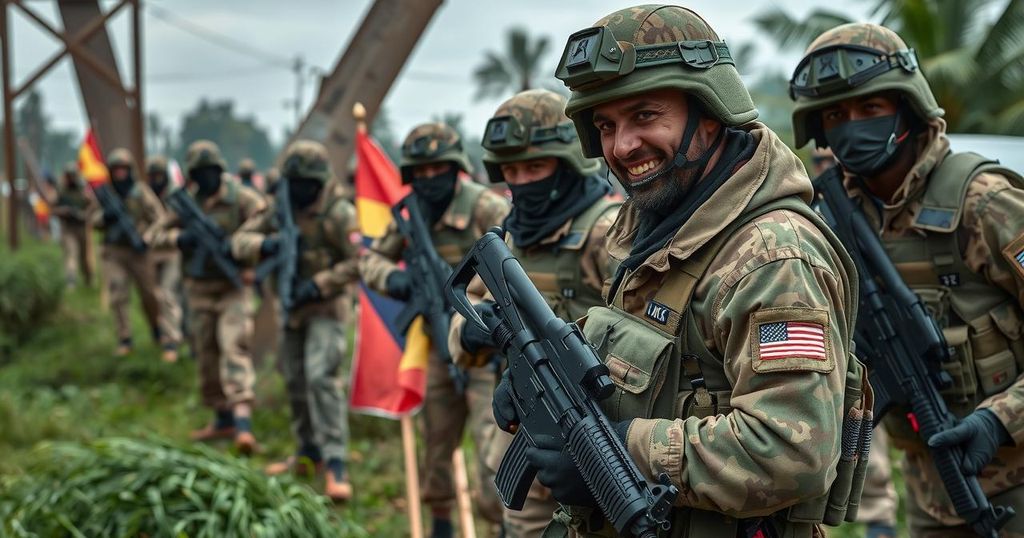Foreign Mercenaries Supporting DRC Against M23 Rebels: Key Insights
In the DRC, Colonel Romuald leads a team from Agemira to support the Congolese army against the M23 militia, which is backed by Rwanda. This foreign involvement raises issues of pay disparity and effective combat capability within the Congolese military, amidst ongoing conflict and humanitarian concerns. Despite their assertions, the role of these private contractors invites scrutiny over the ethics of military privatization.
In the eastern Democratic Republic of Congo (DRC), Colonel Romuald, a veteran of the French army with 36 years of service, currently leads a 20-member team from the Bulgarian private security firm Agemira. Their objective is to advise and support the Congolese military against the M23 militia, a force that has re-armed and gained substantial territory in the mineral-rich North Kivu province with backing from Rwanda. Alongside Agemira, the Romanian company RALF, comprised of around 800 fighters, is involved in defending key locations such as Goma and Sake.
Colonel Romuald perceives the situation as a moral obligation, asserting that foreign mercenaries defend the DRC against unlawful exploitation of its resources by Rwanda. Despite optimistic claims about the M23’s impending defeat by late 2024, ongoing combat and a recent ceasefire have failed to yield peace. The military capability of the Rwandan forces, characterized by superior discipline and resources, poses a significant challenge for the Congolese military, which has faced irregular pay to its soldiers, leading to disenchantment among the ranks.
The disparity in remuneration between foreign contractors and Congolese soldiers is a contentious issue, with the former earning up to $6,000 monthly while local forces receive merely a fraction of that. This inequity breeds resentment and complicates international efforts to stabilize the region. Romuald maintains that the foreign operatives are not mere mercenaries, as they do not engage offensively and operate primarily as consultants. Nonetheless, the volatile dynamics of the ongoing conflict involve multiple actors, including UN peacekeepers and regional forces, complicating the overall situation.
Despite their focus on a non-combative role, the actions of privatized security organizations in conflict zones have drawn scrutiny over ethical implications. As of yet, there are no substantiated allegations against Agemira or RALF concerning violations of human rights, marking a distinction from other notorious private military contractors. The unique context of their operations in the DRC remains a critical component in assessing their impact on the long-standing conflict and humanitarian crisis.
The complex geopolitical landscape of the eastern Democratic Republic of Congo (DRC) has been marred by persistent conflict, particularly due to the activities of the M23 militia, which is perceived to be supported by Rwanda. In a bid to stabilize and reclaim control, the Congolese government has resorted to hiring private military contractors, which has sparked discussions about the implications of foreign involvement in local conflicts. The situation is further complicated by the historical exploitation of the region’s abundant natural resources, leading to humanitarian crises and mass displacements. The presence of foreign mercenaries like Agemira and RALF creates layered dynamics within the ongoing conflict, raising questions about sovereignty, ethics, and the effectiveness of multinational military engagements.
The involvement of private military companies such as Agemira and RALF in the Democratic Republic of Congo illustrates the complexities of contemporary conflict resolution. While they seek to advise and bolster the Congolese military against the M23 rebels, issues of equity, discipline, and effectiveness pose significant challenges. The stark pay difference between foreign and local forces fuels resentment, complicating efforts to achieve lasting peace and stability in the region. Ultimately, the ongoing situation in Goma serves as a reminder of the multifaceted nature of modern warfare and the ethical considerations that accompany the privatization of military operations.
Original Source: www.dw.com




Post Comment